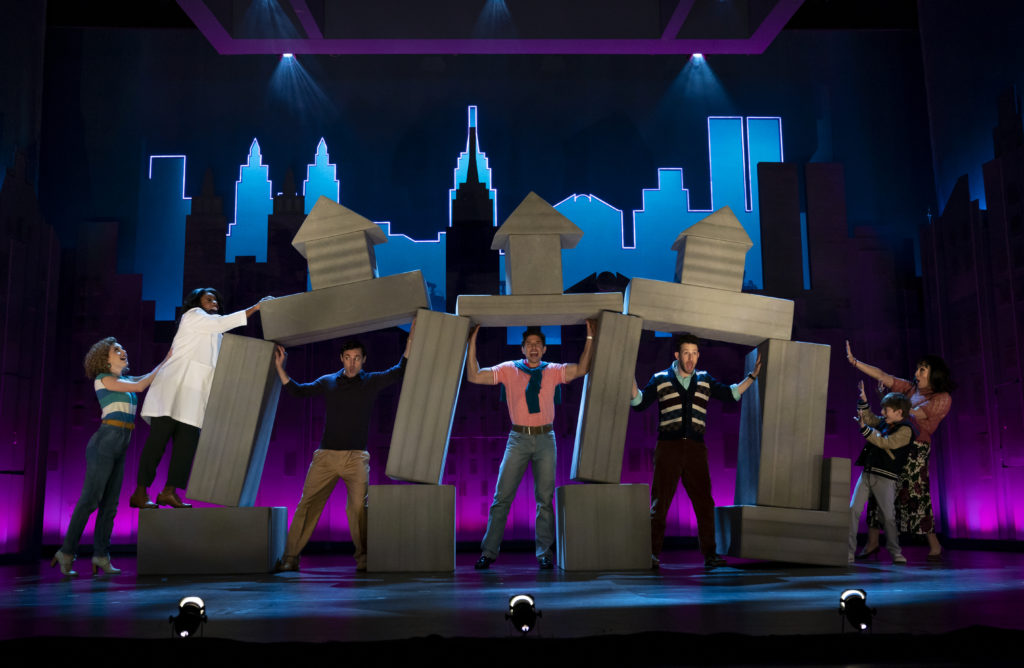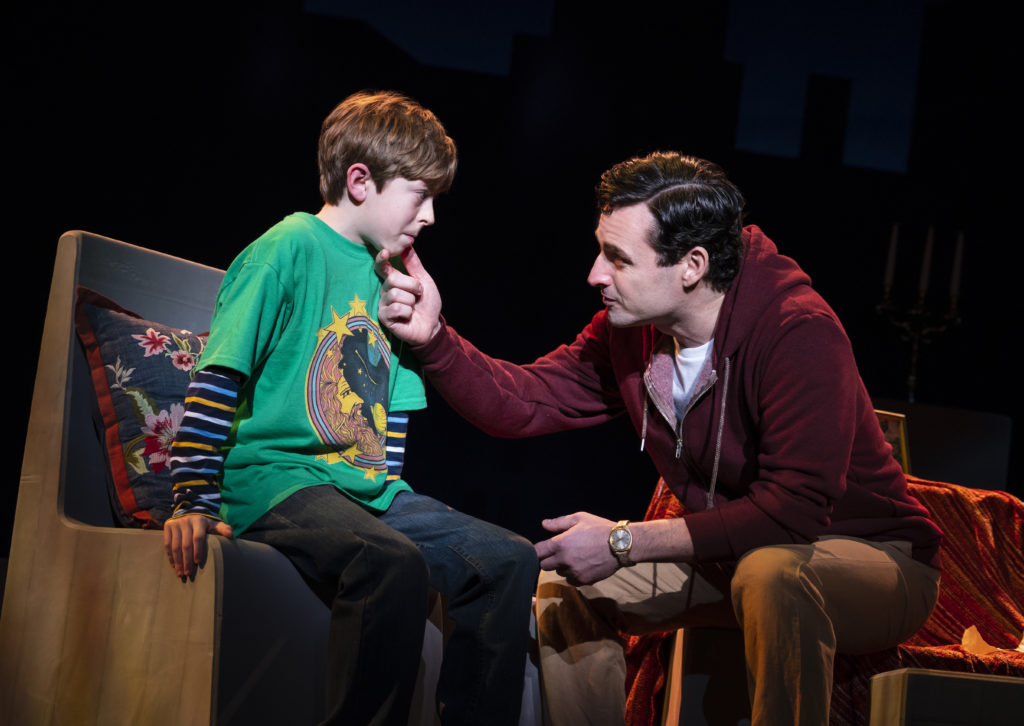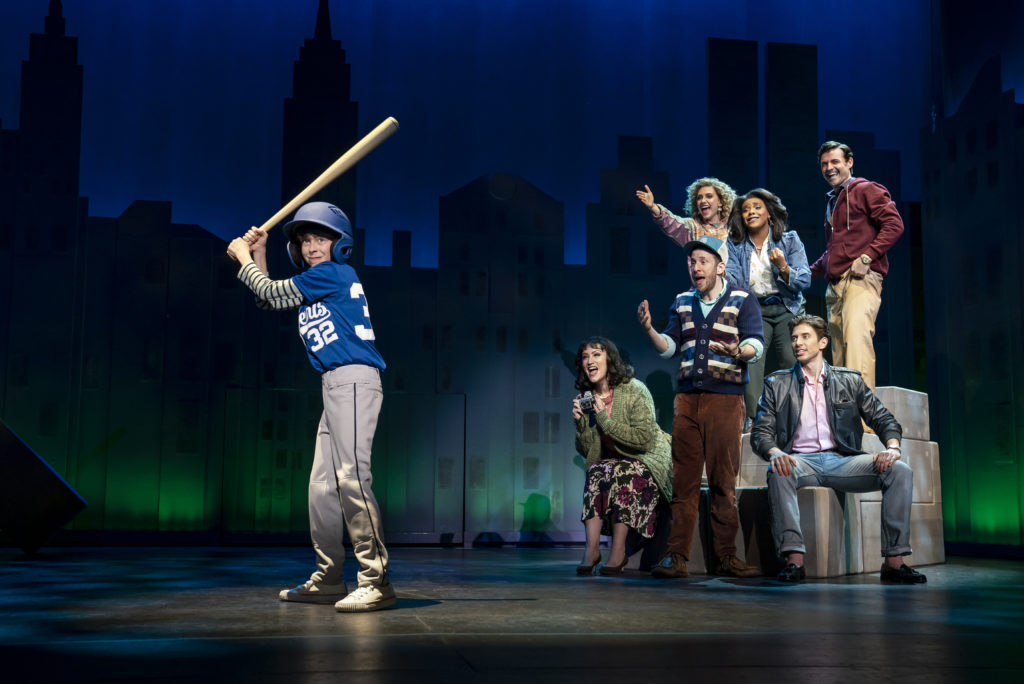
“Falsettos” falls over you in a relentless cascade. The show’s music and lyrics, by William Finn, are remarkably complex, true to the tangle of psychological conflicts they convey. Motifs whirl by, overlapping, dissipating, then resurfacing unexpectedly. The sung-through and unceasingly emotional show, now playing at the Golden Gate Theatre, floods you from start to finish. It gets under your skin on occasion—”swine” and “snide,” are among the resurgent lyrics; apt descriptors, at times, of several characters—and finally works its way through your tear ducts.
Set in 1979 and 1981, “Falsettos” is the first of only two Broadway musicals that have ever directly addressed the AIDS epidemic (the second is “Rent“). Its 1992 production won Tonys for Finn and director/book writer James Lapine. An acclaimed 2016 Lincoln Center revival led to the current tour, with Lapine once again at the helm.
A chamber piece with more impact than most spectacles, “Falsettos” has a cast of just seven and “a teeny tiny band” who sing and play with fevered urgency. The tempos of many passages have been accelerated in the current production, almost challenging audience members to keep up with the cutting wit and U-turn moods of “Falsettos”‘ ever-vacillating and vulnerable central characters.

Even in San Francisco, the opening night audience sometimes didn’t seem quite in sync with “Falsettos”‘s chiaroscuro tones. The show’s second act opens with a gloomily lit stone monument foreshadowing funerals to come. As the word “homosexuals” is sung in a sepulchral minor key, flashlight beams pierce the dark of the orchestra seats. Struck by those beams, many gay theatergoers cheered aloud, as if on the Giants’ Kiss Cam, oblivious to the epoch being portrayed.
Ultimately a story of family, both biological and chosen, “Falsettos”‘s humane, empathetic core resonates strongly enough that this road show’s itinerary includes Saint Paul and Charlotte. But make no mistake, this is also very much a New York story, peopled with brusque, well-off, self-absorbed and highly intelligent Manhattan Jews (There are also two gentile lesbians, one of whom is a Kosher caterer). Think “Crimes and Misdemeanors”-period Woody Allen, with singing and queers.
“Falsettos”‘ plot centers on Marvin (Max Von Essen) a fortyish gay man has moved out of the home he’s shared with his wife, Trina (Eden Espinosa) and 12-year-old son Jason (Thatcher Jacobs on opening night; he alternates with Jonah Mussolino). Marvin’s in thrall to a tempestuous relationship with a decade-younger boyfriend, Whizzer (Nick Adams); in the thick of psychotherapy with the no-less neurotic Doctor Mendel (Nick Blaemire); and thoroughly ashamed of himself. Von Essen’s take on the role is less lacerating than others I’ve seen (Most notably a ferocious Mandy Patinkin). His Marvin’s angry, controlling side is tempered by a sense of genuine bewilderment. In the midst of everything he does, you can sense him asking himself “What am I doing?”
A less bombastic Marvin allows the textures of “Falsettos”‘ other male characters to be highlighted in this production. Mendel the shrink, who ends up marrying Trina and serving as a more conventional father-figure to Jason, is typically played as a romantic, glass-half-full charmer. But Blaemire, a terrific physical actor whose goofy swagger does frequently lighten the mood, also brings out Mendel’s self-serving motivations and a tincture of guilt, revealing parallels to Marvin, not just counterpoints. Adams darkens the superficial twinkle of a twink with his show-stopping rendition of Whizzer’s biting, self-conscious “These Are The Games I Play.” And Thatcher Jacobs doesn’t play a generic kid-in-the-middle here—his Jason is prickly and specific, wriggling away from his father’s embrace, defiantly throwing himself into Walkman-assisted Bar Mitzvah studies to avoid secular reality, and forging relationships with Whizzer and Mendel that feel simpler and safer than his bond with Marvin.

The women’s roles in “Falsettos” aren’t nearly as developed in the men’s in the script or on the stage. The lesbian neighbors, Charlotte (Bryhona Marie Parham) and Cordelia (Audrey Cardwell), arrive in act two to provide Marvin a family of friends, adding little beyond underwritten uplift. But Eden Espinosa plays Trina with more frustration than fragility. Her showcase number, “I’m Breaking Down,” the evening’s comic highlight, is less a plea for pity that a demonstration of strength. Espinosa’s bravura performance imbues the clever woe-is-me lyrics with an “I Will Survive” subtext.
As if to argue against “Falsettos” being perceived as a period piece, David Rockwell‘s minimalist set design largely avoids ’80s references, instead it abstractly echoes the movement of Finn’s music and the characters’ relationships: A giant gray cube that appears early on is dismantled into irregular blocks that are continually rearranged, becoming furniture, pedestals and ultimately a graveyard. Like the stones of ancient Greek landmarks, they evoke ruin and rebuilding, fundamental strength and eternal hope.
